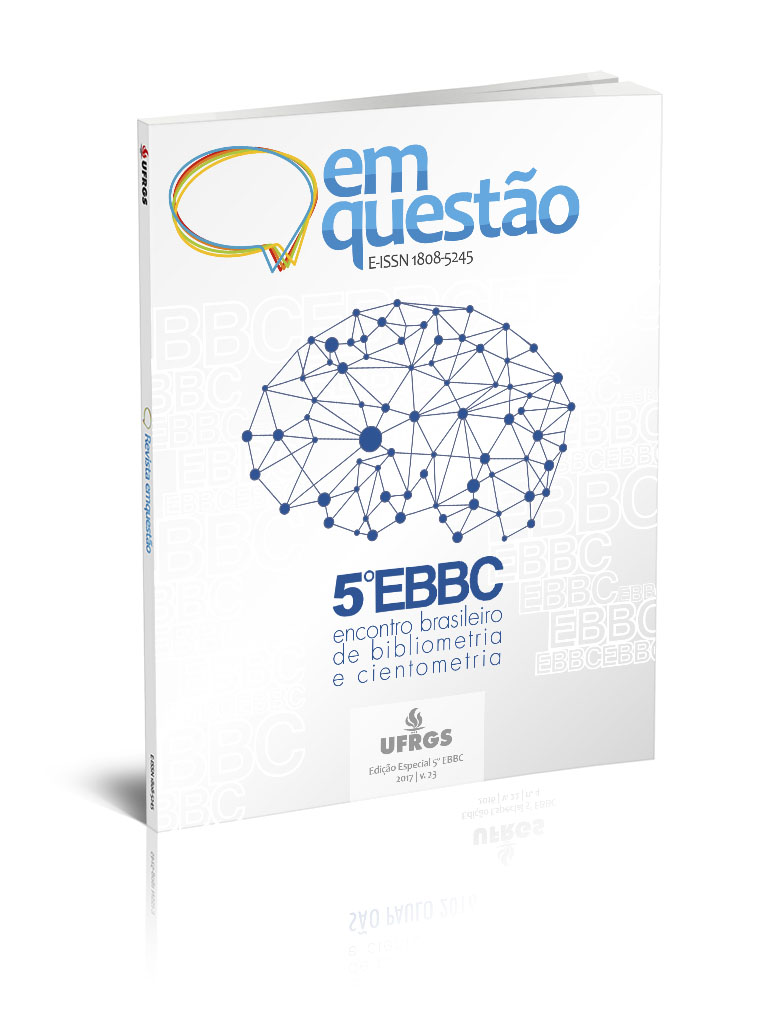The multivariate statistics contribution for graduate assessment in Brazil: a study in Information Science
DOI:
https://doi.org/10.19132/1808-5245230.180-195Keywords:
Graduate assessment. Cluster analysis. Bibliometric indicators. Information Science graduate program.Abstract
This research aims to analyze the contribution of multivariate statistics as a method to support the understanding of the complex methodology of graduate assessment conducted by Coordination for the Improvement of Higher Education Personnel. More specifically, this research seeks to identify the cluster of graduate programs in Information Science generated by cluster analysis and the data generated by boxplot graphics, based on the set of indicators content in the Comparative Spreadsheets of Triennial Assessment of the area, and then comparing groups of graduate programs, according to the concept obtained by the Coordination for the Improvement of Higher Education Personnel assessment, with the result of the cluster obtained by cluster analysis, in order to verify the participation and adequacy of indicators in the allocation of concepts of graduate programs. For all 14 graduate programs of Information Science area, evaluated in the last triennial years (2010-2012), the following indicators were analyzed: total of theses and dissertations, total of papers published, according to Qualis stratification, total of papers published in conference proceedings, books and chapters, full text, collections, and other entries and artistic production published, weighted by faculty member. According to the results, it was observed that while the formed clusters present similar concepts, only the indicators present in the Comparative Spreadsheets of Triennial Assessment were not sufficient to discern them, the inclusion of quality indicators being necessary, since the production indicators are not sufficient to distinguish the programs according to their concepts.Downloads
References
CASTANHA, R. C. G. Indicadores de avaliação de programas de pós-graduação no Brasil: uma análise multivariada na área de Matemática. 2014. 126 f. Dissertação (Mestrado em Ciência da Informação) – Faculdade de Ciência da Informação e Ciências, Universidade Estadual Paulista, Marília.
COORDENAÇÃO DE APERFEIÇOAMENTO DE PESSOAL DE NÍVEL SUPERIOR. Documento de área e comissão. [Brasília]: CAPES, 2013a. Disponível em: <http://www.avaliacaotrienal2013.capes.gov.br/documento-de-area-e-comissao>. Acesso em: 1 dez. 2016.
COORDENAÇÃO DE APERFEIÇOAMENTO DE PESSOAL DE NÍVEL SUPERIOR. Planilhas de indicadores. [Planilhas comparativas de avaliação trienal]. [Brasília]: CAPES, 2013b. Disponível em: <http://www.avaliacaotrienal2013.capes.gov.br/resultados/planilhas-comparativas> Acesso em: 1 dez. 2016.
COORDENAÇÃO DE APERFEIÇOAMENTO DE PESSOAL DE NÍVEL SUPERIOR. Sobre a avaliação. [Brasília]: CAPES, 2014. Disponível em: <http://capes.gov.br/avaliacao/sobre-a-avaliacao>. Acesso em: 1 dez. 2016.
HAIR, J. F. et al. Multivariate data analysis. 7. ed. Upper Saddle River: Prentice Hall, 2009.
HJØRLAND, B. Domain analysis in information science: eleven approaches – traditional as well as innovative. Journal of Documentation, London, v. 58, n. 4, p. 422- 462, 2002.
Downloads
Published
How to Cite
Issue
Section
License
Copyright (c) 2017 Em Questão

This work is licensed under a Creative Commons Attribution 4.0 International License.
Authors who publish with this journal agree to the following terms:
Authors will keep their copyright and grant the journal with the right of first publication, the work licensed under License Creative Commons Attribution (CC BY 4.0), which allows for the sharing of work and the recognition of authorship.
Authors can take on additional contracts separately for non-exclusive distribution of the version of the work published in this journal, such as publishing in an institutional repository, acknowledging its initial publication in this journal.
The articles are open access and free. In accordance with the license, you must give appropriate credit, provide a link to the license, and indicate if changes were made. You may not apply legal terms or technological measures that legally restrict others from doing anything the license permits.













